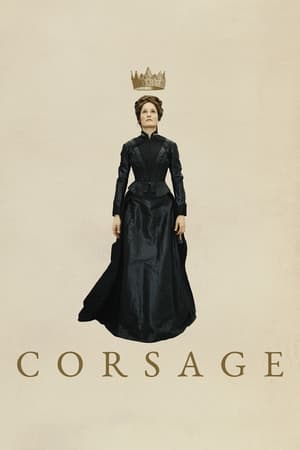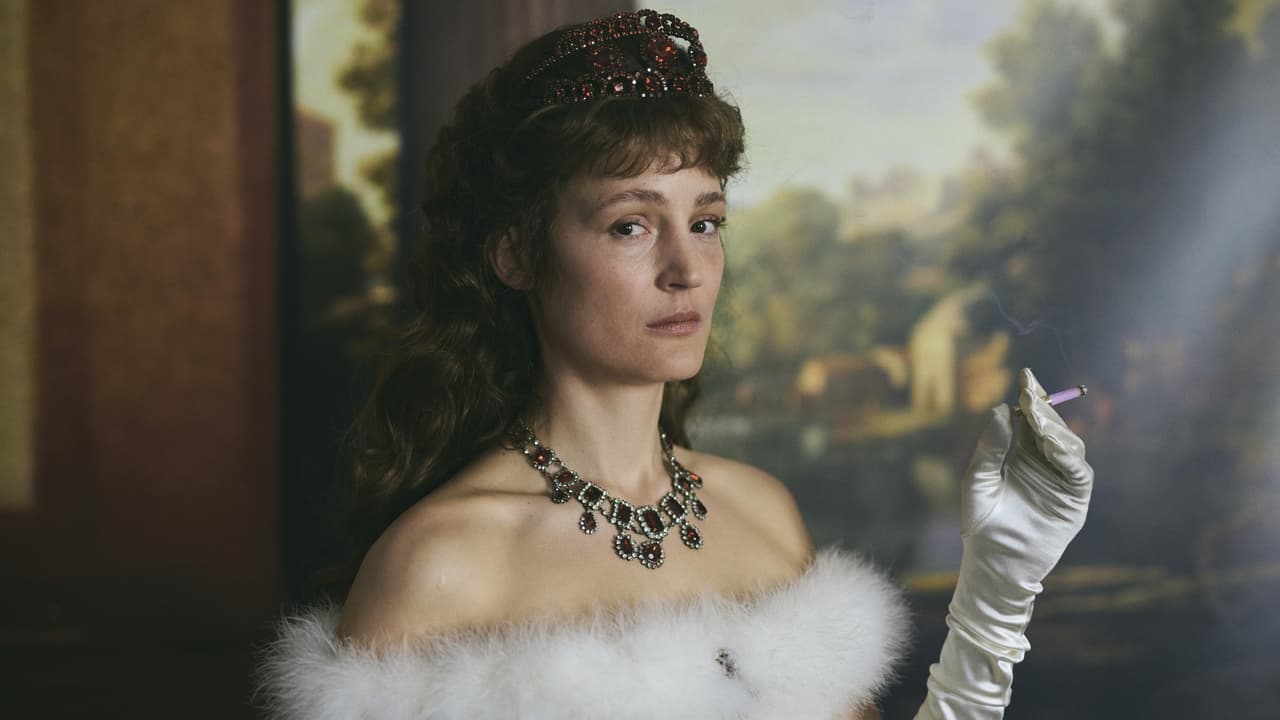
Nobody gets anywhere near a high school prom in Corsage, a European co-production that’s primarily Austrian (that’s where its writer-director, Marie Kreutzer, hails from) but has strategically been given a French title certain to confuse American viewers. Why we decided to shift the word’s meaning to “garish flower arrangement clumsily pinned to a young lady’s bosom by a hapless dork” is unclear—it’s a truncation of the French phrase “bouquet de corsage,” which is like shortening “coup d’état” to “état” rather than “coup”—but Kreutzer employs it here using the original definition, in reference to the undergarment that we call a corset. (Curious, I checked to see what the German word for “corset” is, and can see why Kreutzer passed: “korsett.”) We Yanks are better off this way, frankly, even if some folks will inevitably wind up uncertain of the title’s significance. This movie’s already quite the blunt instrument, and knowing right up front that it’s about a woman who feels constricted not just by the need to exhibit an absurd hourglass figure, but by life itself, makes the experience of actually watching it semi-redundant.
The woman in question, as it happens, is both Empress of Austria and Queen of Hungary, back when that made perfect sense due to those two countries’ merger as the Austro-Hungarian Empire in 1867. Corsage takes place over ten months, from December 1877—when Elisabeth (Vicky Krieps) celebrated her 40th birthday—to October 1878. At that point, she’d been married to Emperor Franz Joseph I (Florian Teichtmeister) for more than 20 years, had lost one child to an unknown illness, and was at once deeply bored with her fundamentally ceremonial existence and increasingly anxious about maintaining the standard of beauty that said existence demanded. Early scenes establish a royal Weight Watchers regimen, with Elisabeth (who I don’t think is ever called “Sissi” in the film, even though that’s how she’s commonly known today) constantly stepping onto the scale as one of her ladies-in-waiting records the result in a ledger that’s evidently used to track fluctuations. Otherwise, she chafes at Franz Joseph’s refusal to invite her counsel on matters of state, rides horses, alternately plays with and ignores her youngest daughter, travels to England (where she keeps a lover, George “Bay” Middleton, played by Colin Morgan), and just generally laments—in dutiful silence, but with a countenance that speaks volumes—the utter uselessness that is her insanely privileged lot.
Here's what Corsage has going for it: Kreutzer has fashioned a strangled mood piece, not an expository biopic. If you’re unfamiliar with Sissi’s tumultuous life and violent death, this movie’s not gonna enlighten you; its final scene occurs a decade before the Mayerling incident (her adult son and his mistress committed suicide, by all accounts shattering Elisabeth completely; this also altered the line of succession in a way that directly led to World War I), and this may well be the only film I’ve ever seen about a historical figure who was assassinated that never even so much as alludes to that fact (although…well, I’ll address Corsage’s unorthodox ending below). Barely resigned frustration isn’t the most captivating mood, however, and Kreutzer’s largely straightforward formal approach just belabors a thesis statement that’s evident almost immediately (albeit not from the title!) and never grows any richer or more complex. It’s the kind of film that cuts from Elisabeth’s visit to an asylum, where she gazes in empathetic horror at a flailing woman who’s not merely strapped down but actually kept in a cage, to a shot of Elisabeth lying awake at night, staring at the ceiling, implicitly reflecting upon marked similarities between that caged woman and herself.
With so little to say or explore, Corsage leans heavily on Krieps, whose magnificent breakout performance in Phantom Thread alternated between playful and anguished. Here, she’s mostly stuck in the middle, faring best when Elisabeth takes active steps to manipulate her circumstances—demonstrating her method of faking a sudden swoon for dramatic effect, for example, or securing a mistress for her husband in what amounts to a formal job interview. Kreutzer also invents an encounter between Elisabeth and Louis Le Prince, one of the men with a claim to having invented the motion picture camera; he shoots some silent, monochrome footage of her (inexplicably presented in the same widescreen aspect ratio as the rest of the movie), which serves no narrative function but emphasizes Elisabeth as a woman trapped in the wrong era. Reassured by Le Prince that his contraption doesn’t capture sound, she merrily screams what are clearly curse words (we don’t hear them, but it’s obvious even if you don’t read lips), and Kreutzer returns to Le Prince’s footage at key moments throughout, as a sort of thematic marker. Which might have been quite effective, were Corsage’s theme not foregrounded at virtually every other moment as well.
Those with an encyclopedic knowledge of cinema history will have recognized that the timeline of this meeting doesn’t work: Le Prince invented his single-lens camera in 1888, a full decade after Corsage takes place. That’s by no means Kreutzer’s most prominent chronological monkey business, either. Multiple scenes are set to needle drops by the contemporary mononymous French chanteuse Camille, and there are even a couple of diegetic musical interludes, like Elisabeth and others listening to a harpist play the Rolling Stones’ “As Tears Go By.” Suggesting a queen’s modern sensibility via 20th-century tunes is an idea so inspired that Sofia Coppola employed it 17 years ago in Marie Antoinette, which is a better movie than Corsage in almost every respect (though, to be fair, the two are tackling the same basic subject from radically different perspectives, agewise; Kirsten Dunst’s Marie is a teenager as the film begins, much more befuddled than stifled). And while Coppola imbued her entire film with anti-historical energy, Kreutzer merely tosses occasional cute anachronisms in as a light seasoning. The result is the worst of both worlds: a smattering of pseudo-punk attitude (note Corsage’s ad campaign, in which Krieps’ immaculately gloved hand flips us off) enshrouded in naturalistic tedium. Neither Elizabeth nor The Favourite, but something awkwardly in between.
And then there’s the ending, about which I don’t want to say too much, since those who might enjoy its revisionist wish-fulfillment will do so more thoroughly if it comes as a surprise. Again, Sissi was assassinated in real life, at the age of 60. Corsage ends fully 20 years earlier than that, but it nonetheless manages to propose an alternate fate for its subject—one that could theoretically be viewed as consistent with the historical record (steps are taken to reconcile them) but is obviously a fantasy. This sort of thing has become Tarantino territory, between the Inglourious Basterds killing Hitler and two Hollywood has-beens saving Sharon Tate, which makes it feel even more as if Kreutzer’s pilfering ideas from others. (Coppola and Tarantino even dated for a while!) At the same time, this particular instance manages to be at once triumphal and defeatist, which is a neat trick, pulled off more adroitly here than in perhaps any film since Thelma and Louise. And while saying that a movie's closing credits are the best thing about it inevitably sounds thank-christ-that's-over snotty, this film joins Claire Denis’ Let the Sunshine In as a sincere example, with the unexpected image over which those credits scroll genuinely making me feel a bit more warmly toward an experience that I'd largely disliked. I just wish that it were remotely tonally representative of Corsage as a whole.
One of the first notable online film critics, having launched his site The Man Who Viewed Too Much in 1995, Mike D’Angelo has also written professionally for Entertainment Weekly, Time Out New York, The Village Voice, Esquire, Las Vegas Weekly, and The A.V. Club, among other publications. He’s been a member of the New York Film Critics Circle and currently blathers opinions almost daily on Patreon.






